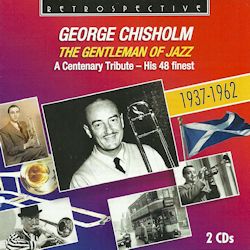CD1
1. Honeysuckle Rose
2. I Ain’t Got Nobody
3. Mighty Like The Blues
4. Jazz Me Blues
5. Don’t Try Your Jive On Me
6. Mozel Tov
7. If You Were The Only Girl In The World
8. Stooge Blues
9. Shine On, Harvest Moon
10. The Flat Foot Floogie
11. Let’s Go
12. Archer Street Drag
13. Rosetta
14. You’ll Always Be Mine
15. Penalty Five Pounds
16. No Smoking
17. At The Jazz Band Ball
18. The Darktown Strutters’ Ball
19. Jersey Bounce
20. Blue Lou
21. Cherokee
22. Stompin’ At The Savoy
23. Poor Butterfly
24. Ida, Sweet As Apple Cider
25. All Is Not Gold That Jitters
26. Broadhurst Garden Blues
27. Little Earle
CD2
1. My Blue Heaven
2. That’s The Beginning Of The End
3. Symphony In Riffs
4. Lazy River
5. Blues For Twos
6. Just You, Just Me
7. I Gotta Right To Sing The Blues
8. Sonny Boy
9. Georgetta
10. I May Be Wrong
11. When Your Lover Has Gone
12. A Smo-o-oth One
13. Things Ain’t What They Used To Be
14. Love Me Or Leave Me
15. How’s This?
16. Mood Indigo
17. That’s A Plenty
18. My Mother’s Eyes
19. Big Butter And Egg Man
20. Lazy
21. What More Can I Say?
I knew George Chisholm. Well, at least I played in a jazz group accompanying him at a jazz club when he was the star attraction. I had first seen him when
I was much younger, in concerts by the Squadronaires, also known as the Royal Air Force Dance Orchestra. This double CD samples his work from 1937 (his
first recording as a trombonist) to 1962, although he continued to live until 1997. The personnel is too numerous to list, but I shall try to mention the
most significant players. George was an affable man as well as a fine trombonist and entertainer. The entertainment aspect made him a household name when
he appeared in comedy interludes in The Black and White Minstrel Show (a television and stage show) for a decade from 1961, when he appeared
wearing an incongruous striped shirt and bowler hat. But I witnessed much earlier slapstick routines when he delighted audiences with comedy segments
during the Squadronaires’ concerts.
The first track on the first CD – Honeysuckle Rose recorded in 1937 by pianist Gerry Moore and his Chicago Brethren (an indication of how much
British musicians wanted to be regarded as in line with their transatlantic brothers!) – shows Chisholm already a practised performer: relaxed and
unhurried. George was also among the select band of British musicians employed by visiting Americans. Tracks 2 and 3 on the first CD include George playing
in a group led by Benny Carter (track 3 including Coleman Hawkins), while track 10 has George alongside Fats Waller in 1938.
Chisholm was also used by well-known British bandleaders such as Danny Polo (tracks 4 to 7), Lew Stone (track 17) and Victor Silvester (tracks 22 to 24).
But by 1938 George was already a bandleader in his own right, leading groups that often contained his close friend, trumpeter Tommy McQuater (a fellow Scot
and another humorous man). George’s Jive Five (tracks 11 to 16) perform some swinging numbers, including four compositions by Chis himself. Their version
of Earl Hines’ Rosetta swings along lightly, with a buoyant piano solo from Eddie Macaulay.
The 1940s bring us to George’s work with the Squadronaires (Tommy McQuater still an important member). This was as much a dance band as a jazz band but
artists like Chisholm could inject swing into their performances. George’s arranging skills are also clear in these Squadronaires tracks, especially Cherokee, which avoids being a hasty rush to the finish and instead supplies some subtle touches in the voicings and counterpoint.
The second CD opens with evidence of the Squadronaires’ post-war life in My Blue Heaven and That’s the Beginning Of The End, both
precisely performed 1947 recordings. Thereafter most of the tracks are by small groups, either led by Chisholm or containing him as an essential member.
Five tracks by George Chisholm & Octet are like a who’s who of British jazz in the 1950s, among them altoist Joe Harriott, vibist Bill Le Sage and
drummer Phil Seamen. Many of the same musicians appear with The Melody Maker All Stars in Mood Indigo. George provides glimpses of his two sides
with an emotive solo in I Gotta Right To Sing The Blues and a more jaunty solo to close the track. Digby Fairweather’s sleeve-note fills in some
gaps by noting that Chisholm did much studio work in the 1950s as well as appearing in the BBC Show Band.
A 1961 album called Trad Treat supplies tracks 18 and 19, cashing in on the craze for trad jazz. George’s solo on My Mother’s Eyes
illustrates his complete control of the trombone as well as his lyrical ability. Big Butter And Egg Man shows him totally at home playing in
Dixieland style. This CD closes with a 1962 recording in which George is the prominent soloist behind Clinton Ford’s cheery vocals.
During his life George Chisholm certainly contributed greatly to the gaiety of nations. I still remember him affectionately for his riotous comedy
performances as well as for his expert musicianship. Making allowance for their age, these recordings have been polished up nicely.
Tony Augarde
www.augardebooks.co.uk
